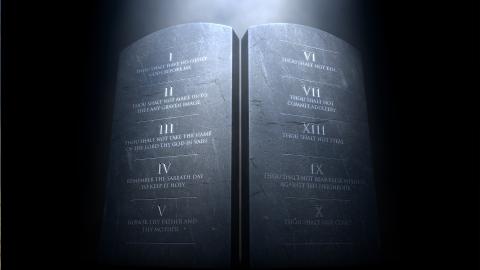Faith on Trial: Federal Judge Blocks Louisiana Law Requiring Ten Commandments in Public School Classrooms

Constitutionality of Classroom Commandments Sparks Intense Debate Over First Amendment
In a pivotal ruling, U.S. District Judge John W. deGravelles halted the implementation of a Louisiana law mandating the display of the Ten Commandments in every public classroom, deeming it “unconstitutional on its face.” The law, which had been scheduled to take effect in January, would have required all publicly funded educational institutions in Louisiana, from kindergarten classrooms to university lecture halls, to hang the commandments in an 11-by-14-inch framed display accompanied by a contextual statement on their historical relevance.

Judge deGravelles’ decision stems from a lawsuit filed by a coalition of parents and civil liberties organizations, including the American Civil Liberties Union (ACLU) and Americans United for Separation of Church and State, all united in their stance that the law infringes on the First Amendment’s protections of free exercise and establishment of religion.
In his decision, deGravelles cited precedents set by the Supreme Court, notably Stone v. Graham, a 1980 ruling in which the justices found a similar Kentucky law unconstitutional. “The law violates foundational principles of neutrality in public education and the preservation of individual religious freedom,” deGravelles wrote, stressing that the classroom is a space for diverse beliefs.
An Ongoing Battle over the Role of Faith in Public Life
The law’s supporters argue that the Ten Commandments transcend religious symbolism, asserting that the historic code has shaped the moral foundations of U.S. law. Defenders maintain that the law was designed to underscore this historical impact, not to enforce religious adherence. Louisiana Attorney General Liz Murrill, speaking at a press conference following the ruling, described the law as constitutionally sound and insisted that “the posters were privately funded and reflect historical—not exclusively religious—values.”
However, critics, including the ACLU, have argued that regardless of funding or context, the posters amount to religious endorsement. “Our public schools are not Sunday schools,” read a statement from the ACLU. “Students of all faiths—or no faith—deserve an environment free from religious endorsement.”
A History of Legal Controversy
The ruling marks another chapter in the long-standing debate over the presence of religious texts in public education. The Stone v. Graham decision, which barred Kentucky from imposing similar displays in classrooms, remains one of the most influential cases in First Amendment jurisprudence. In that ruling, the Supreme Court held that such displays are “plainly religious in nature” and constitute government endorsement of a specific faith.
The Road Ahead: An Appeal in the Works
With the law on pause, the legal spotlight now turns to Murrill’s anticipated appeal, which could take the case all the way to the U.S. Supreme Court. Murrill remains adamant that the law is constitutional and stated that her office would continue to argue that “posters can be created in ways that fully comply with constitutional mandates.”
For now, deGravelles has ordered that the state notify all schools of the preliminary injunction, leaving Louisiana’s public classrooms Ten Commandments-free until further court action. As the lawsuit proceeds, the case may set a new precedent on the boundaries of religious expression in public spaces and signal a shift in the legal landscape regarding faith in government-funded institutions.




